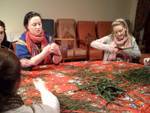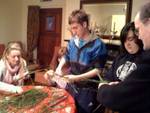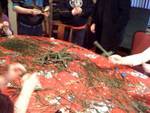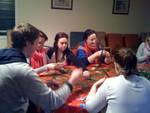Jesus said, ‘I must proclaim the Good News of the Kingdom of God.’ (Luke 4:43)
Communication is a key area of importance when ensuring the safety of children, young people and vulnerable adults in our diocese. Care should be taken and systems implemented to ensure that all those with particular responsibility for children, young people and vulnerable adults, and indeed all those in the church, know the key personnel and recording systems in the Diocese.
The following information is to be communicated in the Diocese:
- any concerns or disclosures of abuse;
- the contents of this document;
- updates on developments in relation to civil law, procedures and diocesan progress in safeguarding children;
- the contact information of relevant personnel in the area of safeguarding children and vulnerable adults;
- the passing of information between the Diocesan Committee for Safeguarding Children and the NBSCCC;
- the experience in parishes and diocesan groups.
Any concerns or disclosures of abuse
The procedures to be followed and the requirements and recommendations for communication in this area are outlined in Standard 2.
The Diocesan Policy and Procedures for Safeguarding Children
The Diocesan Committee for Safeguarding Children has a responsibility to review the Diocesan Policy and Procedures in line with the recommendations of the NBSCCC and to ensure that all Safeguarding Children Representatives and clergy are familiar with its content and aware of any updates. Supplementary information is included on the diocesan website (www.archdioceseofarmagh.com).
The Safeguarding Children Representatives have a responsibility to ensure that all those working with children, young people and vulnerable adults in their parish/group are familiar with and adhere to the Diocesan Policy and Procedures and have a copy of the shortened version of the Policy when provided by the Diocesan Committee.
Updates on developments in relation to civil law, procedures and diocesan progress in safeguarding children
This is the responsibility of the Diocesan Safeguarding Children Committee through the trainers and Designated Officers. The Diocesan Committee will be responsible for communicating these changes to the Safeguarding Children Representatives/Committees who will in turn be responsible for communicating it to all personnel in the parish or diocesan group.
The contact information of relevant personnel in the area of safeguarding children and vulnerable adults
Contact details for the Designated Officers, the Training Coordinator and the Chairperson of the Safeguarding Children Committee are listed in Appendix 2 and should be widely distributed throughout the Diocese. Posters will be designed by the Diocese with the contact details of the Designated Officers and forwarded to all parishes. It is the responsibility of the priests of the parish and the Safeguarding Children Representatives to ensure they are clearly visible in all parish (and where applicable diocesan) premises. Once distributed, additional copies will be available from the Diocesan Secretary. The contact details for the Designated Officers will also be available on the diocesan website and the NBSCCC website.
Contact information for the Diocesan Committee for Safeguarding Children and the Training Coordinator will be available on the diocesan website and distributed regularly to Safeguarding Children Representatives.
Contact information for the Safeguarding Children Representatives is to be displayed on the diocesan website under the information for each parish and in poster form in the parishes. Safeguarding Children Representatives should be sure to update the relevant Diocesan Safeguarding Children personnel of any changes in contact information who will in turn update the diocesan website. It is the responsibility of the Safeguarding Children Representatives and the priests of the parish to ensure that the posters are displayed on parish premises and the information is accurate
The passing of information between the Diocesan Committee for Safeguarding Children and the NBSCCC
The NBSCCC and the Diocese will communicate through the Bishops’ Conference, the Committee for Safeguarding Children, the Diocesan Designated Officers and the training team. This information will be fed through to the Diocesan Committee and shape any developments in Diocesan Policy or Procedures.
The experience in parishes and diocesan groups
The regular meetings of Safeguarding Children Representatives give opportunity for sharing experiences and identifying common issues. This may be done in a formal manner through the agenda and over refreshments. Safeguarding Children Representatives may wish to form their own support relationships. It is important in this sharing to adhere to the guidelines on confidentiality.
Methods of communication will include:
- a newsletter for safeguarding children representatives and clergy;
- the diocesan website;
- bi annual meeting of the Safeguarding Children Representatives will take place either in Pastoral Areas or at diocesan level;
- regular updates at the clergy conferences;
- annual diocesan update;
- Day to day support of Safeguarding Children Representatives and clergy by members of the Diocesan Committee for Safeguarding Children.



 The students are all participating in this the pilot year of the Pope John Paul II Awards in the Archdiocese.The award launched in October has generated a high level of interest amongst schools and parishes and is proving an excellent vehicle for securing the involvement of our young people.
The students are all participating in this the pilot year of the Pope John Paul II Awards in the Archdiocese.The award launched in October has generated a high level of interest amongst schools and parishes and is proving an excellent vehicle for securing the involvement of our young people. few locals the group got together for an evening of celebration,music and prayer as they worked together bridging the generations in the small community. The young people created special invitations for their elderly neighbours who lived in the nearby fold,who were delighted to be asked along.Those in attendance marvelled at the enthusiasm,energy and kindness of the young people during what turned out to be a great evening’s fun.
few locals the group got together for an evening of celebration,music and prayer as they worked together bridging the generations in the small community. The young people created special invitations for their elderly neighbours who lived in the nearby fold,who were delighted to be asked along.Those in attendance marvelled at the enthusiasm,energy and kindness of the young people during what turned out to be a great evening’s fun.

You must be logged in to post a comment.